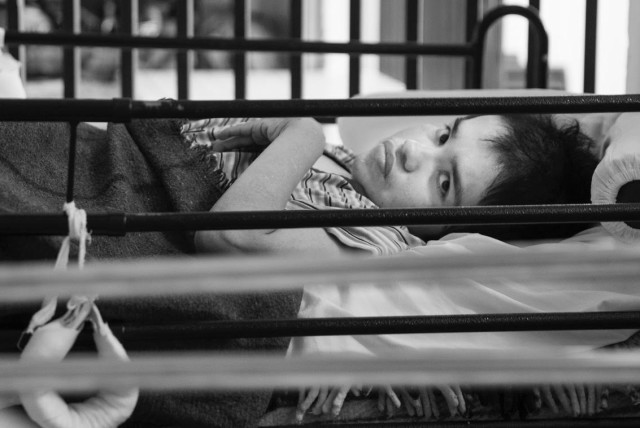Meet the Jewish activist fighting for the rights of people with disabilities

“This is one of the world's greatest overlooked human rights problems today. Tens of millions of people are still locked up, out of public view. The challenge is enormous.”
From an early age, Eric Rosenthal was passionate about human rights and tikkun olam — repairing the world.
He ascribes his interests to his Jewish roots and upbringing in places like Tunisia, Ivory Coast, Niger, and Italy, the remote postings where his father’s career as a U.S. government aid official took the family.
When Rosenthal started on his career path to become an attorney in Washington, D.C., in the early 1990s, he identified one group of people he felt were being left behind by human rights organizations: those with disabilities.
“This is one of the greatest overlooked human rights problems in the world today,” Rosenthal said. Tens of millions of people are still locked up, out of public view. The challenge is enormous.”
He eventually launched his own nonprofit organization to help them: Disability Rights International, which documents abusive practices around institutionalizing adults and children with disabilities and campaigns to end the institutionalization of children altogether. It also uses international courts to protect victims of abuse and ensure their full inclusion in society.
Rosenthal says he was inspired to become an activist on this issue by the grassroots efforts of civil rights activists in the 1970s and ‘80s – especially parents of children with disabilities. Disability activists and lawyers worked to shut down places like the Willowbrook mental health facility on New York’s Staten Island. In 1972, Geraldo Rivera, then a young TV news reporter, described it in an infamous TV exposé as a snake pit for 5,300 residents, “filled with children lying on the floor, naked and smeared with their own feces.”
“But it was the disability activists, the parents of kids with disabilities, and the civil rights lawyers who made change happen; that inspired me,” Rosenthal said. When I entered law school at Georgetown University, I wrote a paper about how human rights laws applied in such institutions as well as how the world needed to address these terrible abuses. Back in law school, I dreamed up a plan to use international law to close down the snake pits of the world.”
Poor treatment of people with disabilities is a worldwide issue
Outside of the United States, he soon discovered, abusive treatment of those with mental health conditions was even more widespread.
For his first job after law school, Rosenthal went to Mexico to investigate abuses by the military against indigenous people. At a psychiatric hospital in Mexico City, he saw inmates surrounded by barbed wire, hosed down rather than given showers and forced to fight over scraps of food. Later on he traveled to Hungary, where he observed children in orphanages locked in cages.
“The staff didn’t even refer to them as human beings,” he said. “I learned that when people are unaware that those with disabilities have rights, they’re unaware they have anything to hide.”
Rosenthal says he found little interest in the abuse of the disabled among mainstream organizations concerned with human rights abroad.
“There was lots of literature about the political abuse of psychiatry in the Soviet Union, where dissidents were put in hospitals as a way to discredit them,” Rosenthal recalled. “Amnesty International, Human Rights Watch and the State Department would describe 1,000-bed psychiatric facilities where people were locked up against their will and given these horrible medications. But their report was always about the two or three dissidents there — while overlooking thousands of other people because they were perceived as having disabilities or mental illness.”
Rosenthal launched Disability Rights International in 1993 and soon began bringing the world’s attention to their abuse using a combination of public advocacy and lawsuits.
“I realized that if I didn’t do it no one would,” he said.
Today, the Washington-based organization has offices in Ukraine, Mexico, and Britain and helps bring international attention to abuses worldwide. In 2013, Rosenthal won The Charles Bronfman Prize for his work. The $100,000 annual award – celebrating its 20th Anniversary this year– recognizes a Jewish humanitarian under age 50 whose work “is grounded in their Jewish values and is of universal benefit to all people.”
For the last two years, Rosenthal, now 60, has been focusing a lot of attention on Ukraine. Over 100,000 children are currently trapped in Ukrainian institutions, according to Rosenthal, and have been subject to even more serious human rights abuses since Russia invaded Ukraine in February 2022.
“People with disabilities are especially at risk in times of war and other emergencies,” he said. “But international donors and humanitarian relief groups too often overlook those people. If you have a kid with a disability in Ukraine, there’s very little support, so families are under great pressure to institutionalize their children. Since Russia’s invasion of Ukraine, that’s been a primary focus of my work.”
Rosenthal’s family originally comes from the western Ukrainian town of Drohobych, which before World War II was inhabited mostly by Jews.
“I’m personally very inspired by my Jewish background. It’s not a coincidence that I was drawn to Ukraine. My family is from there, including my grandmother, who was diagnosed with manic depression,” he said.
Rosenthal said Jewish values help guide his work.
“The one line in the Torah that always meant the most to me was the commandment to protect the stranger, because we ourselves were strangers in the land of Egypt,” Rosenthal said. “You can view that literally, because we work to defend the rights of people we consider strange, people who never quite fit in — those with mental disabilities who are often kept out of mainstream society.”
Another area of focus is Latin America — especially Argentina, Colombia, Guatemala, Mexico and Uruguay. Disability Rights International recently won a major case before the Inter-American Human Rights Commission, establishing a right to community integration of children and adults with disabilities.
“I was at an institution in Mexico, where we found a garage with 95 kids and adults who were not allowed to go outside,” Rosenthal said.
Some of the most disturbing encounters during his career occurred when Rosenthal visited a psychiatric hospital in Istanbul and saw patients subjected to electric shock treatment without anesthesia.
In Serbia, Rosenthal once found a child tied to a bed with his arms and legs left to waste away. Those in charge didn’t think they were doing anything wrong.
“People in the room didn’t believe this was torture because the intent was not to cause the child pain,” he said.
Rosenthal’s work is not limited to abuses overseas. In Washington, Disability Rights International is working to advance the International Children with Disabilities Protection Act of 2023 — a far-reaching piece of legislation that would establish an office in the State Department to assist disability and family organizations abroad and promote policies that help disabled children avoid institutions and make the transition to independent living. The bill won Senate approval last year and has been introduced in the U.S. House of Representatives but has not yet been passed.
“We will need a strong push from disability activists and other supporters,” Rosenthal said. “But if we get this thing through Congress, it will have a massive worldwide impact on our issues.”
This story was sponsored by and produced in partnership with The Charles Bronfman Prize, an annual prize presented to a humanitarian whose innovative work fueled by their Jewish values has significantly improved the world. This article was produced by JTA’s native content team.
Jerusalem Post Store
`; document.getElementById("linkPremium").innerHTML = cont; var divWithLink = document.getElementById("premium-link"); if (divWithLink !== null && divWithLink !== 'undefined') { divWithLink.style.border = "solid 1px #cb0f3e"; divWithLink.style.textAlign = "center"; divWithLink.style.marginBottom = "15px"; divWithLink.style.marginTop = "15px"; divWithLink.style.width = "100%"; divWithLink.style.backgroundColor = "#122952"; divWithLink.style.color = "#ffffff"; divWithLink.style.lineHeight = "1.5"; } } (function (v, i) { });

